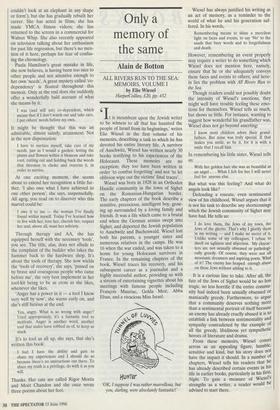Only a memory of the same
Main de Botton
ALL RIVERS RUN TO THE SEA: MEMOIRS, VOLUME I by Elie Wiesel HarperCollins, £20, pp. 432 It is incumbent upon the Jewish writer to be witness to all that has haunted the people of Israel from its beginnings,' writes Elie Wiesel in the first volume of his memoirs, describing a task to which he has devoted his entire literary life. A survivor of Auschwitz, Wiesel has written nearly 30 books testifying to his experiences of the Holocaust. These memoirs are no exception; they too have been written in order 'to combat forgetting' and not 'to let oblivion wipe out the victims' final traces'.
Wiesel was born in 1928 in an Orthodox Hasidic community in the town of Sighet on the Romanian-Hungarian border. The early chapters of the book describe a sensitive, precocious, intelligent boy, grow- ing up surrounded by a loving family and friends. It was a life which came to a brutal end when the German armies swept into Sighet, and deported the Jewish population to Auschwitz and Buchenwald. Wiesel lost both his parents, a younger sister and numerous relatives in the camps. He was 16 when the war ended, and was taken to a home for young Holocaust survivors in France. In the remaining chapters of the book, Wiesel traces his recovery, and his subsequent career as a journalist and a highly successful author, providing us with a stream of entertaining vignettes about his meetings with famous people including Francois Mauriac, Golda Meir, Abba Eban, and a vivacious Miss Israel.
`OK I suppose I was rather marvellous, but you, darling, were absolutely fantastic!' Wiesel has always justified his writing as an act of memory, as a reminder to the world of what he and his generation suf- fered. In his words,
Remembering means to shine a merciless light on faces and events, to say 'No' to the sands that bury words and to forgetfulness and death.
However, remembering an event properly may require a writer to do something which Wiesel does not mention here, namely, ensure that he or she adequately conveys these faces and events to others; and here- in lies the problem with All Rivers Run to the Sea.
Though readers could not possibly doubt the intensity of Wiesel's emotions, they might well have trouble feeling these emo- tions for themselves. Wiesel tells us much, but shows us little. For instance, wanting to suggest how wonderful his grandfather was, Wiesel does not go beyond asserting:
I know most children adore their grand- fathers. But mine was truly special. If that makes you smile, so be it, for it is with a smile that I recall him.
In remembering his little sister, Wiesel tells
us: With her golden hair she was as beautiful as an angel . . . What I felt for her I will never feel for anyone else.
But what was this feeling? And what do angels look like?
Defending a roseate, even sentimental view of his childhood, Wiesel argues that it is not his task to describe any shortcomings which the Jewish community of Sighet may have had. He tells us:
I do love them, the Jews of my town, the Jews of the ghetto. That's why I glorify them in my writing — and I make no secret of it. Unlike some of my colleagues, I refuse to dwell on ugliness and abjection. My charac- ters are not sexually obsessed or pathologi- cally greedy. Of course, they were not all messianic dreamers and aspiring poets. What of it? The enemy has heaped enough abuse on these Jews without adding to it.
It is a curious line to take. After all, the fate of the Jews of Sighet would be no less tragic, no less horrific if the entire commu- nity had indeed been sexually obsessed or maniacally greedy. Furthermore, to argue that a community deserves nothing more than a sentimental portrait of itself because an enemy has already cruelly abused it is to establish a link between sentimentality and sympathy contradicted by the example of all the greedy, libidinous yet sympathetic heroes of literature and drama.
From these memoirs, Wiesel comes across as an appealing figure, humble, sensitive and kind, but his story does not have the impact it should. In a number of chapters, Wiesel tells his readers that he has already described certain events in. his life in earlier books, particularly in his firs!, Night. To gain a measure of Wiesel s strengths as a writer, a reader would be advised to start there.


































































 Previous page
Previous page